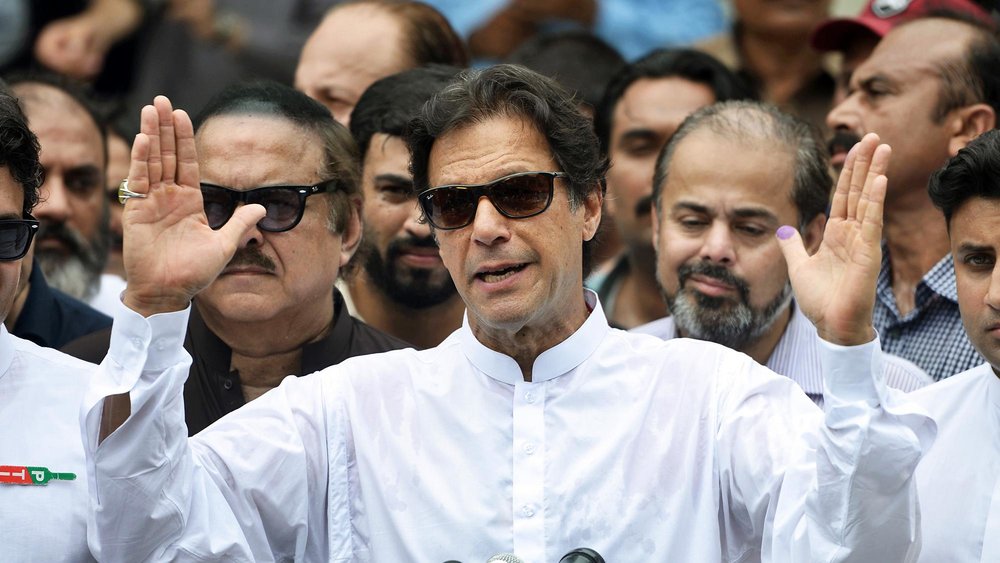For Pakistan’s new PM, the biggest challenge is tottering economy

TEHRAN - The long cherished dream of cricketer-turned-politician Imran Khan finally became a reality on Saturday when he was sworn in as the new prime minister of Pakistan, more than 20 years after joining active politics. It is believed to be one of the most challenging roles in world politics but Khan has appeared confident and has vowed to build the foundation of ‘Naya Pakistan’ (New Pakistan).
Khan’s Pakistan Tehreek Insaf (PTI) won the most number of seats in July 25 Pakistan general election but fell short of the absolute majority to form the single-party government. He will now be heading a PTI-led coalition government, which makes his job less easier.
His swearing-in-ceremony on Saturday saw a galaxy of eminent people from different fields in attendance, including the members of 1992 cricket world cup winning team and many foreign dignitaries. Khan had led Pakistan to World Cup win in 1992, which catapulted him to dizzying heights of fame and stardom in Pakistan.
The ceremony was also attended by services chiefs, members of civil society, bureaucrats, lawyers, and senior leaders of the various political parties of Pakistan. It was a simple ceremony, devoid of any extravaganza, in sync with Khan’s poll promise of bringing austerity and combating corruption.
Although he fumbled over some of the words of his oath administered by President Mamnoon Hussain, Khan cannot afford to falter on some of the pressing issues facing Pakistan today. According to pundits, the biggest challenge for his government will be the flailing economy.
The fiscal deficit between imports and exports has reached a record high, around USD 35 billion that speaks a lot about Pakistan’s trade policies, stagnant export base and the liberal imports policies, the Express Tribune reported.
How Khan turns around the economy of Pakistan will eventually determine his success or failure as the premier of Pakistan, believe experts. Having promised an ‘Islamic welfare state’, Khan’s task is cut out.
He has been optimistic so far about the country’s future despite the “grave economic crisis” and rampant corruption. In his message on Pakistan’s Independence Day on August 14, Khan said he is filled with the “greatest optimism” on this day.
“Despite our grave economic crises, due to corruption and cronyism, I know if we are united in our resolve, we will rise to the challenge and Pakistan will become the great nation envisaged by our Quaid and Iqbal,” he said, referring to the vision of Pakistan’s founding fathers Mohammad Ali Jinnah and Sir Mohammad Iqbal.
But he inherits an economic situation that his own finance minister Asad Umar has described as “dire”, and he has to rebuild most of the institutions that have broken down and weakened over the years.
Reports about Pakistan approaching the International Monetary Fund (IMF) for a bailout have been doing rounds over the past few weeks, but no final decision has been taken yet. Last week, Umar was quoted saying that Pakistan will decide by the end of September if it will go to the IMF or not. “By the end of September, we should make our decision,” Umar said.
In an interview with Tehran Times, scholar and former lawmaker Farahnaz Ispahani said Pakistan needs both immediate and long term relief. “Even if the IMF program is obtained it will involve onerous conditions,” she said. “Pakistan needs to break out of its cycles of boom and bust but for that serious reform, not gimmicks and temporary solutions, are needed.”
Ayesha Siddiqa, a military scientist and political commentator, agreed that the new government must address economic woes before anything else. “Pakistan desperately needs money to survive. The Americans have put pressure on the International Monetary Fund (IMF) not to give Pakistan a bail out,” she told Tehran Times, referring to the recent statement of U.S. Secretary of State Mike Pompeo.
Pompeo had strongly objected to the idea of IMF loan being used by Pakistan to pay back Chinese loans, as U.S. and China are currently locked in a bitter trade war. “Make no mistake,” Pompeo said. “We will be watching what the I.M.F. does.”
So, it is still not clear whether or not Pakistan will approach the IMF for a bailout, and if it does, will IMF turn down the request under the U.S. pressure. It will be Pakistan’s 13th bailout from IMF.
But there is also speculation that Pakistan will approach its new all-weather-ally China, from which it has borrowed heavily in recent years to finance the CPEC (China Pakistan Economic Corridor), a $62 billion ambitious project currently underway.
The immediate dilemma for the new Pakistani prime minister is to choose between Chinese help or the IMF bailout. But, in both cases, the hindrance will be the U.S.
“Because of its ongoing trade and tariff war with China, U.S. is punishing Pakistan by objecting to the IMF bailout,” said Mohammad Qadir Gilani, Islamabad-based analyst. “Imran Khan must tread cautiously but without compromising country’s sovereignty and independent foreign policy.”
